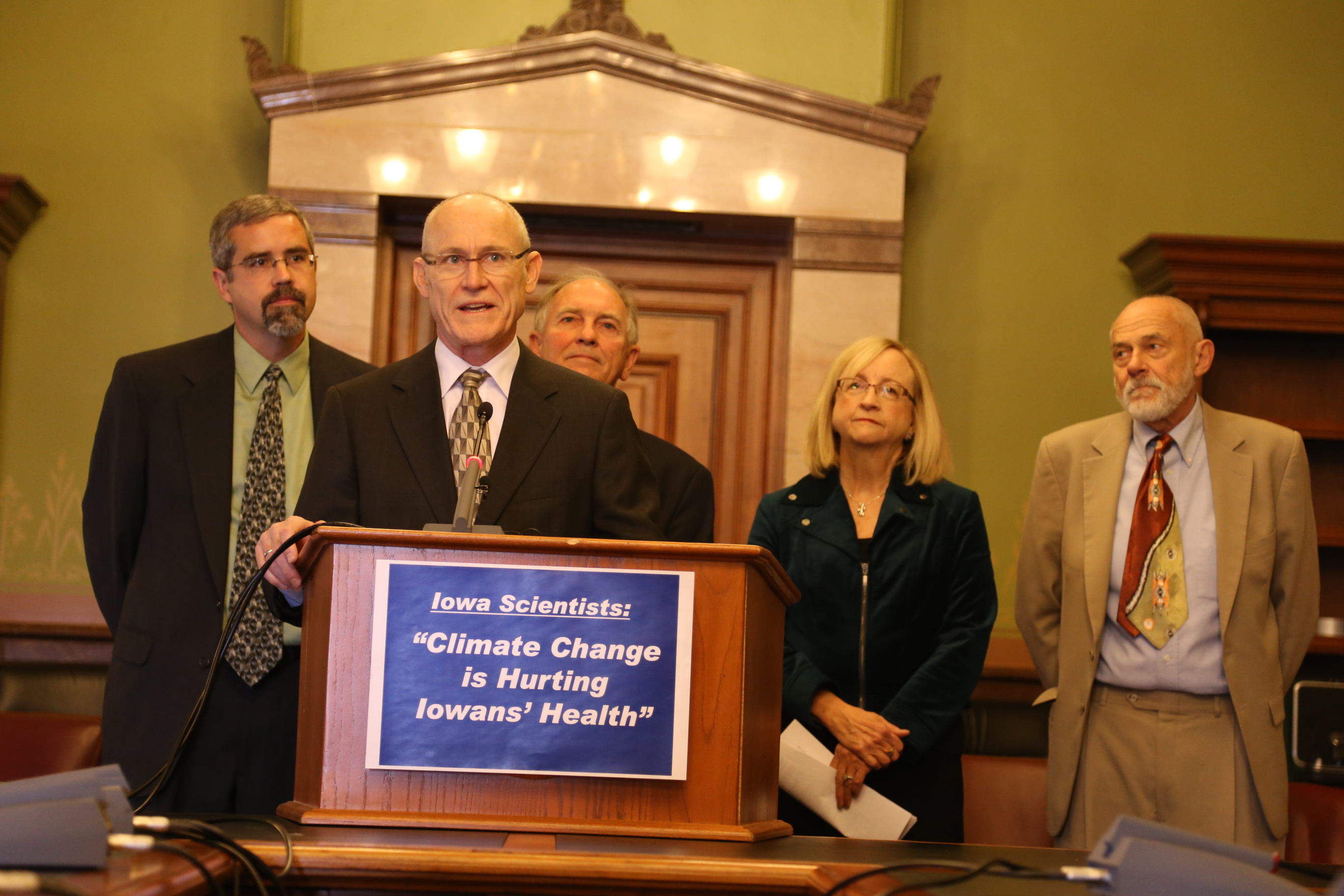College of Liberal Arts & Sciences
Leading Iowa Scientists Say Climate Change Hurting Iowans' Health

Iowans are experiencing real impacts from climate change, including heavier rains and increased flooding. Human health effects from climate change are just as real and are already being felt in Iowa, according to a statement released today by statewide group of 180 Iowa scientists.
“Climate change is negatively impacting our water quality, increasing exposures to allergens and air pollutants, introducing new infectious diseases, and imposing increased stress on Iowa families,” said Peter Thorne, Professor and Head of the Department of Occupational & Environmental Health, College of Public Health, University of Iowa
The scientists say the health‐related effects of extreme weather events are the most obvious, immediate, and direct. These events are increasing in frequency and severity as our atmosphere warms and holds more moisture.
“Repeated heavy rains increase human exposure to toxic chemicals and raw sewage that are spread by flood waters,” said David Osterberg, Associate Clinical Professor, Department of Occupational and Environmental Health, University of Iowa.
Degraded water quality is also directly associated with climate change. “In farm states like Iowa, higher water temperatures combine with high nutrient levels to create large harmful algal blooms which make water unsuitable for human and animal consumption and for recreation,” stated Osterberg.
“The Iowa Climate Statement 2014: Impacts on the Health of Iowans,” which was released today, was signed by 180 science faculty and research staff from 38 Iowa colleges and universities. The statement is the 4th Annual Iowa Climate Statement issued by Iowa scientists and researchers.
“The strong support for the statement reflects the consensus among Iowa science faculty and research staff that action is needed now to lower emissions and find new ways to adapt to climate changes in order to reduce the risks of new health problems,” stated Dave Courard-Hauri, Associate Professor, Environmental Science and Policy Program, Drake University.
Climate change is also making it more difficult for many Iowans to breathe. Plants produce more pollen, pollen that is increasingly potent in response to warmer temperatures and higher carbon dioxide levels in the air.
“The number of Iowans with respiratory problems such as childhood asthma has increased dramatically since the 1980s. In many cases, this is linked to increased exposures to flood molds and to higher indoor moisture, as well as to lung-damaging ozone and fine particulate matter from burning fossil fuels,” said Thorne.
“New infectious diseases are becoming more common in the Midwest as the organisms that carry them move north due to rising temperatures. Disease carrying mosquitos and ticks are living longer and expanding their range due to increasing temperatures, more rainfall, and longer summers,” said Yogesh Shah, Associate Dean, Department of Global Health, Des Moines University.
“Our changing climate’s influence on mental health is less obvious, but it is well established that thousands of Iowans have been impacted by stress from the loss of homes and income due to climate-related flooding and drought,” Mary Mincer Hansen, Adjunct Professor, College of Health Sciences MPH Program, Des Moines University.
“As long as greenhouse gas emissions continue to increase, climate‐related health problems will continue to grow,” said Neil Bernstein, Chair, Department of Natural and Applied Sciences, Mount Mercy University. The scientists agree that adopting strong climate‐change policies will play a vital role in diminishing human suffering and illness now and for generations to come.
“It is clear that expanding energy efficiency and clean renewable energy efforts will have the co‐benefits of reducing air pollution and the creation of additional jobs and economic opportunities for Iowans,” stated Bernstein.
The lead authors of the “Iowa Climate Statement 2014: Impacts on the Health of Iowans” include:
Peter S. Thorne, Professor and Head Department of Occupational & Environmental Health, Director, Environmental Health Sciences Research Center, College of Public Health, University of Iowa
Yogesh Shah, Associate Dean , Department of Global Health, Des Moines University
David Osterberg, Associate Clinical Professor, Department of Occupational and Environmental Health, College of Public Health, University of Iowa
Mary Mincer Hansen, Adjunct Professor, College of Health Sciences MPH Program, Des Moines University
David Courard-Hauri, Associate Professor, Environmental Science and Policy Program, Drake University
Neil Bernstein, Chair, Department of Natural and Applied Sciences, Mount Mercy University.
Editing assistance by Connie Mutel, Senior Science Writer, IIHR-Hydroscience & Engineering, University of Iowa.
The 38 Colleges and Universities of statement endorsers:
Buena Vista University
Central College
Clarke University
Coe College
Cornell College
Des Moines Area Community College
Des Moines University
Dordt College
Drake University
Eastern Iowa Community College
Ellsworth Community College
Grinnell College
Indian Hills Community College
Iowa Central Community College
Iowa Lakes Community College
Iowa State University
Iowa Western Community College
Kirkwood Community College
Loras College
Luther College
Maharishi University of Management
Morningside College
Mount Mercy University
Northeast Iowa Community College
Northwestern College
Scott Community College
Simpson College
Southeastern Community College
Southwestern Community College
Saint Ambrose University
University of Dubuque
University of Iowa
University of Northern Iowa
Upper Iowa University
Waldorf College
Wartburg College
Western Iowa Tech Community College
William Penn University
Endorser affiliations are for identification purposes only and do not reflect views of their academic institutions.
The statement can be found at www.cgrer.uiowa.edu